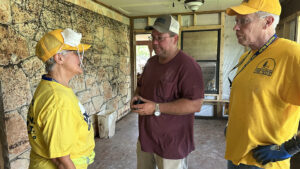
PHOENIX (BP)–Following is a time table outlining the major events surrounding the embattled Baptist Foundation of Arizona:
April 1996 — Foundation attorney L. Kyle Tresch resigns. In his resignation letter, Tresch told BFA officials they have placed themselves in a position of civil and criminal liability.
April 1998 — The Phoenix NewTimes, a tabloid, accuses the BFA of many financial irregularities that threatened the foundation’s stability.
July 2, 1998 — December 10, 1998 — Arizona Corporation Commission begins an investigation of BFA based on the Phoenix NewTimes reports.
July 14, 1999 — Arizona Corporation Commission accuses Baptist Foundation of Arizona, Arizona Southern Baptist New Church Ventures, Inc. and Christian Financial Partners, Inc. of violating Arizona Securities Act. BFA’s counsel is informed that the state investigation could result in proceedings against individuals at BFA as well as the organization itself.
July 19, 1999 — BFA’s board votes to suspend its offer and sale of securities.
July 22, 1999 — BFA’s board accepts the offers of President Bill Crotts, General Counsel Tom Grabinski and Controller Don Deardorff to relinquish their BFA responsibilities although remain as BFA employees.
Aug. 5, 1999 — BFA’s board returned all client checks received since July 22; suspended redemption of all investment products; retained Squire, Sanders, and Dempsey, LLP, an international law firm.
Aug. 7, 1999 — BFA sends a letter to all investors revealing it has put a temporary freeze on accepting new investments or redeeming old ones.
Aug. 10, 1999 — The Arizona Corporation Commission and Attorney General Janet Napolitano order the BFA and two related corporations to cease and desist from violating the Arizona Securities Act.
Aug. 11, 1999 — The Arizona Republic reports the foundation’s funds have been frozen as a result of the investigation.
Aug. 27, 1999 — A class action lawsuit filed by investor Franklin Kestner Sr. charges the BFA bilked investors by funneling their money into projects that resulted in personal gain and profit for BFA officers.
Aug. 28, 1999 — The BFA board of directors votes to terminate the employment of William Crotts, Thomas Grabinski, and Donald Deardorff. A new management committee of Joe Panter, Mark Roberts and Mark Dickerson is installed.
Aug. 30, 1999 — Pastor Richard A. Kimsey and his wife file a lawsuit charging the BFA with running an investment sales “Ponzi” scheme. Kimsey reportedly invested $100,000 with BFA.
Sept. 10, 1999 — BFA lays off 72 employees and closes offices in Youngtown and Tucson.
Sept. 20, 1999 — Pastor Richard A. Kimsey amends his lawsuit against BFA to include the Arizona Southern Baptist Convention and Steve Bass, executive director treasurer of the convention’s Executive Board.
Sept. 22, 1999 — Former BFA director James Cook files a lawsuit against BFA in Maricopa Superior Court.
Sept. 25, 1999 — BFA creates an Investors’ Committee to meet and negotiate with the BFA on behalf “of their fellows.”
Oct. 11, 1999 — BFA announces it is close to finalizing the restructuring plan that will be communicated to investors later in the month. The BFA opens a web site address ‘www.bfaz.org’ to answer questions.
Nov. 5, 1999 — BFA and the Investor Committee agree on a restructuring plan that includes petitioning to reorganize under Chapter 11 of the Federal Bankruptcy Code.
Nov. 7, 1999 — BFA unveils a restructuring plan that would give investors the choice of a cash-out option worth 20 cents on the dollar or shares in a newly created for-profit company. Up to $40 million is available for the cash-out plan.
Dec. 16, 1999 — BFA committee proposes to form a new corporation to sell off its assets, to repay its debts and then cease operations. The previously announced “cash out” plan is shelved after talking to more than 4,000 investors.















